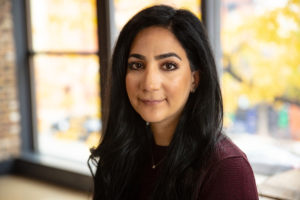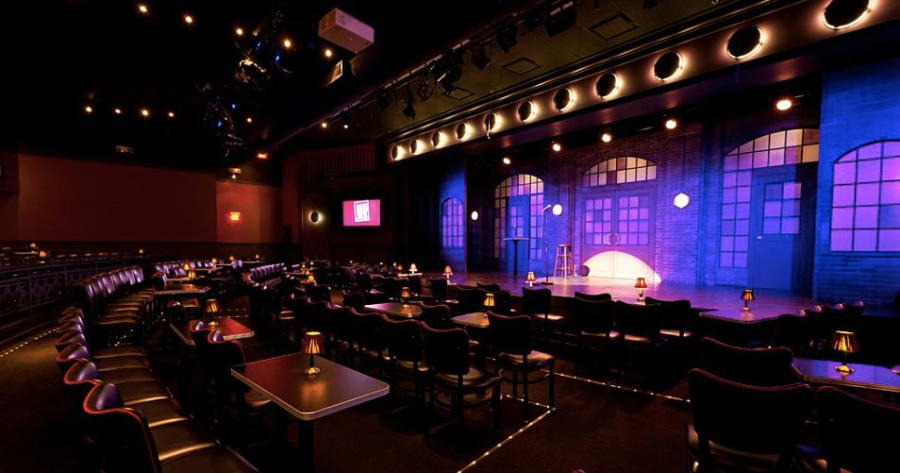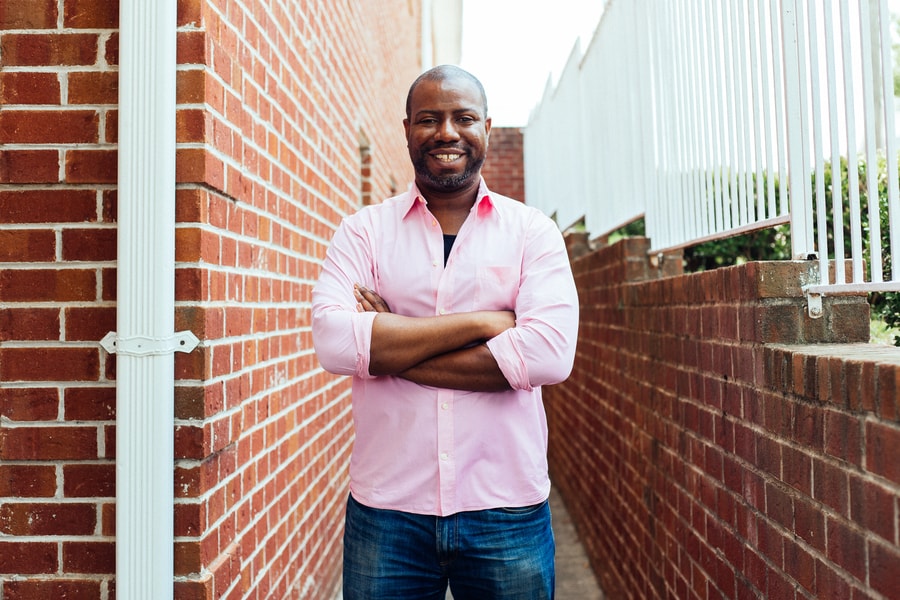It was an opportunity he had to jump on. Jon Carr (he/him), who had been leading Atlanta improv theatre Dad’s Garage, joined Chicago comedy staple the Second City as its new executive producer on Dec. 15, 2020, following an impulse that he would be able to continue the work he was passionate about in Atlanta on a much larger scale in the Windy City. With his new position, Carr is able to take his mindset—which puts equity, inclusivity, and supporting artists at its heart—to a nationally renowned comedy institution with a broad reach; he will oversee Second City’s Chicago, Toronto, and Los Angeles locations. Four months into his tenure, the theatre’s virtual efforts during the pandemic mean that the company is now advancing those values not just nationally, but globally.
“It’s a huge workload,” Carr admitted, “but we have an amazing team. Regardless of if I’m doing this for 10 years, it’s really going to be the team that we have around all three theatres that are going to make them successful. It’s a little strange, because there’s nothing routine happening at any of them right now, so it’s a lot of rebuilding of things from scratch. So it’s been a challenge, but also a creative opportunity that’s been really fun.”
“From scratch” includes a bit of a reinvention for Second City, which was bought by a private equity group in February and faced allegations of institutional racism in late 2020. And that’s before mentioning that other seemingly stalwart comedy institutions were shuttering, with Chicago’s iO Theater announcing its permanent closure and even the Upright Citizens Brigade closing its New York space as a result of the pandemic. It’s easy to look at the circumstances swirling around Second City and wonder what the future could hold, and whether the comedy giant will still be the same institution that has churned out comedy legends for 60 years. What Carr emphasized in a recent interview was his desire to respect and honor that history and the special ability of the company to meld sketch and improv, and then to find a way to take what Second City uniquely does well in new ways and new avenues.

One avenue the company has discovered through the pandemic has been an influx of virtual opportunities. Second City COO Parisa Jalili (she/her) said she was bracing for audiences not to buy into the company’s move to virtual offerings. Instead, being forced into this new venue has unlocked something for the company, she said. In moving everything from performances to training center classes and corporate client offerings online, the theatre is now figuring out how to incorporate and maintain this newly robust virtual presence as in-person work begins to restart.
“Our students,” Jalili said, pointing to the company’s training center as an example, “a third of them now come from areas that we don’t have physical locations in, which looks completely different than pre-pandemic, where you had to be in Toronto, L.A., or Chicago to take a class with us. That’s no longer the case.”

According to Elizabeth Howard (she/her), Second City’s vice president of production, the company has spent the last year honing the production elements of their virtual offerings so that now they can focus on the aspects of that virtual work appeal most to their audience. One surprise: Second City’s ability to successfully adjust their corporate and training work, which might normally involve a group of teachers or facilitators flying to a specific location to work with a client but now means making custom videos for corporate clients. The result: that area of their work has positively thrived during the pandemic, according to Jalili.
That said, Second City leaders were quick to point out that just because something can be done digitally doesn’t necessarily mean it should be.
“We want to make sure that it maintains a virtual audience and there’s a reason why they are continuing, not just because they didn’t want to pay travel or something like that,” said Jalili. “That’s something our creative teams are working on very diligently right now, making sure that those offerings, whether it be in-person or virtual, really feel purposeful for the platform they’re using.”
But it’s hard to deny the success, especially in an art form so grounded in the electricity of audience laughter and participation. Howard pointed to a New Year’s Eve virtual happy hour show hosted by the company: Over a thousand tickets were sold, and the joy people brought into the room was palpable, she said. Despite the screen dividing them, they were still able to achieve the essential feelings of community, connection, and shared laughter.
This successful online venture now has Second City leadership focused on its potential to scale. As their view shifts to global potential, the door may be opening for new audiences, new kinds of shows, and new partnerships. For Carr that means finding unique programming while still maintaining the decades-old Second City core. When discussing what that programming could look like moving forward, Carr emphasized the importance of an inclusive and representative season and being intentional about what is populating Second City’s seven stages. The long-term goal, he said, is to create a space that allows patrons to walk in and be met with a true variety of options, offering differing perspectives and ideas. This would not only keep the theatre feeling fresh, Carr said, but would offer the theatre’s artists new challenges and “a bigger playground than we’ve ever created before.”

“At the end of the day, I want to put artists in the best possible place to succeed,” said Carr. “So it’s not so much, ‘I’m Jon Carr and here’s my beautiful artistic vision and how I’m going to shape Second City.’ It’s me coming in and saying, ‘What are the skill sets of the artists that we have? What are they passionate about? And how can we build opportunities and platforms around them to express themselves?’ I think that’s how you keep this fresh, because there’s always another class and another generation coming down who have their own unique skills and abilities.”
This emphasis may also help the company diversify its audience base, said Carr, who noted the success he saw at Dad’s Garage in that area. An important part of this effort is partnerships that uplift a variety of voices. One example he pointed to was Second City’s partnership with Black Improv Alliance to provide the 100 Black Improvisers scholarship, providing opportunities for Black performers to participate in Level 1 of Second City’s improv program. A partnership like this, Carr noted, must be an opportunity for Second City to work with an organization to create shows that both uplift the organization and the artists in the production. These efforts, and the potential impact could have in broadening the theatre’s audience, are one reason reason Carr has been excited about a move to the Chicago theatre.
“At Dad’s Garage, I was part of an improv group called Dark Side of the Room,” Carr explained. “It was an all-Black improv group. It was great, as someone who has spent maybe 15, 16 years at Dad’s Garage, seeing that almost completely white audience start changing because of these very specific programs that we did.”
Carr said he has a good sense of how to replicate this kind of success at Second City, while maintaining all of what has made it special to its audiences for decades. Its audiences are looking to return as soon as May 7, the company’s announced reopening date. They’ve worked with Actors’ Equity Association to make sure their spaces and procedures are compliant and ready to go. Carr said there’s so much excitement about the potential of getting back onstage that even mundane tasks like creating rehearsal schedules are fun to do. Even with all the excitement about the live return, Second City’s online growth has given them something to lean on while they cautiously make their way back to full capacity.
“We want to put safety first,” Carr said, “so things will come out in stages. We’ve been doing so much work over the past months. It’s great to get to a point where things are turning on and we’re getting to show people the work that we’re doing. Come see Second City back and better than ever.”
Jerald Raymond Pierce (he/him) is associate editor of American Theatre. jpierce@tcg.org





